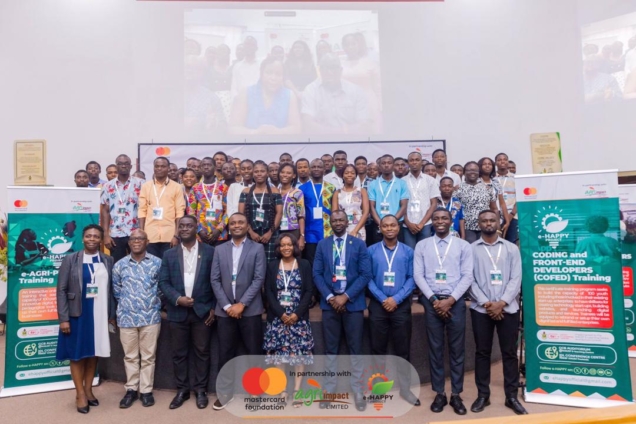In a significant step towards revolutionizing Ghana's agricultural sector, the E-HAPPY (Harnessing Agricultural Prosperity and Productivity for Youth) training programme has held its inaugural welcome and orientation meeting for its first cohort.
This is a joint initiative by the Mastercard Foundation in partnership with Agri-Impact Limited and hosted by the Kwame Nkrumah University of Science and Techology's (KNUST) E-Learning Centre and I-School Consult
In his welcome address at the meeting, Project Lead and professor of the Department of Soil Sciences, KNUST, Prof Ewusi Mensah, highlighted the overarching goal of the E-Happy programme which is to deepen the use of youth-led digital solutions in transforming Ghana's agrifood systems.
He emphasised that these solutions encompass the conceptualization, design, development, evaluation, and application of ICT tools for all actors along the agrifood value chains.
Agri-Impact, an agribusiness consulting and project management firm with over 15 years of experience in West Africa and beyond, plays a crucial role in this initiative.
The firm has been instrumental in advising on the government's flagship One District One Factory programme and provides training, mentorship, and development services.
Professor Ewusi Mensah drew parallels with successful digital platforms like Bolt, Netflix, and Facebook to illustrate the transformative power of technology.
He cited Twiga Foods in Kenya as examples of how digital platforms can connect farmers with market information and buyers, thus eliminating middlemen and ensuring fair pricing.
The E-HAPPY training programme aims to equip 75 youth with the skills to impact Ghana's agricultural sector by leveraging digital technology.
Out of these, 50 will be trained to become digital agricultural entrepreneurs, or e-agripreneurs, while the rest will focus on coding and programming.
Professor Ewusi Mensah encouraged participants to envision careers as agriculture technology specialists, digital agriculture instructors, digital agriculture extension agents, researchers in digital agriculture, farm management consultants with a focus on digital solutions, and e-agriculture sales representatives.
Director of the KNUST E-Learning Centre, Professor Eric Appau Asante, also congratulated the participants, emphasising the programme's practical approach and the three key pillars: E-Agripreneur training, the Coding and Front-End Developers training.
He assured that the training would be hands-on and engaging, starting with an introduction to the learning management system developed specifically for the programme.
The first module of the E-Agripreneur training will cover e-extension services, providing training, advisory services, and expert consultation to farmers.
The second module will focus on remote monitoring and control systems, teaching participants to manage farm environments remotely.
The digital financial services module will introduce integrating mobile money and digital payments into agriculture operations.
Lastly, the e-agri commerce module will help participants utilise digital platforms for agricultural marketing and commerce.
Participants will undergo intensive learning with projects, tasks, and assignments to reinforce their skills.
The coding and programming training will begin with an introduction to web programming, followed by online coaching and a presentation to showcase their progress.
Later modules will cover data concepts, ensuring practical and applicable skills.
Participants expressed their excitement and expectations for the programme.
Emmanuel Sarpong, interested in e-commerce, hopes to gain the tools and knowledge to start his own business.
Emmanuel Owusu Tabiri looks forward to learning about global digital agricultural technologies and funding opportunities.
Phillip Kissi aims to meet the demands of modern agriculture and agripreneurship, while Shiela Cornelius plans to integrate digital technologies into greenhouse vegetable crop production.
Professor Eric Appau Asante assured participants that their expectations would be met through strict adherence to the programme's structures.
Daniel Acquaye, Group CEO of Agri-Impact Limited, and Mrs. Juliana Asante Dartey, Deputy CEO, highlighted the programme's goal to create jobs for 326,000 young people across Ghana over four years, focusing on the rice, soya, poultry, and tomato value chains.
They stressed the importance of using digital innovations to transform agriculture and encouraged participants to identify business opportunities throughout the training.
Mrs. Dartey thanked the leadership of KNUST for partnering to bring the programme to fruition. She reminded participants of the competitive nature of the selection process and urged them to make the most of the opportunity by identifying business ideas and applying their new skills.
The programme will culminate in awards for the top five performers.
With the E-Happy training programme underway, the future of Ghana's agriculture sector looks promising, driven by the enthusiasm and innovation of its youth.
The orientation concluded with a tour of the KNUST E-Learning Centre, showcasing the tools and equipment available to support the training, made possible by the Vice-Chancellor of KNUST, Prof Mrs. Rita Akosua Dickson.
Latest Stories
-
Traditional Overlord of Nchumuru urges Oti Minister to complete abandoned projects
3 mins -
Major summit set to back Ukraine’s territorial integrity
27 mins -
7 powerful steps the very best listeners follow
28 mins -
Roads Minister inspects ongoing road projects in Northern Region
32 mins -
Stonebwoy drops ‘Your Body’ ahead of global album release
34 mins -
Putin peace terms slammed at Ukraine summit
38 mins -
Two New York men die falling into a manure tanker
44 mins -
WAEC awardee with 8 As not in the university over lack of funds
55 mins -
Israel announces military pause on Gaza road to let in aid
1 hour -
‘We have economic challenges, power outages but not consumed’ – Gifty Afenyi-Dadzie
1 hour -
‘I won’t retract the truth; sue me now’ – Ablakwa dares Freddie Blay
2 hours -
We’ve goofed a little – NPP MP on detained medical supplies at the port
2 hours -
Crispen celebrates African youth resilience with ‘Mafaro’
2 hours -
B3du’s ‘Holy Water’: A Harmonious blend of love and joy
3 hours -
Zoomlion Foundation and partners launch ‘Keep Your Mind on the Road’ campaign
10 hours

